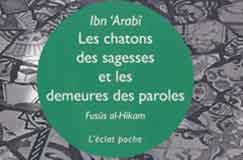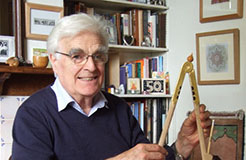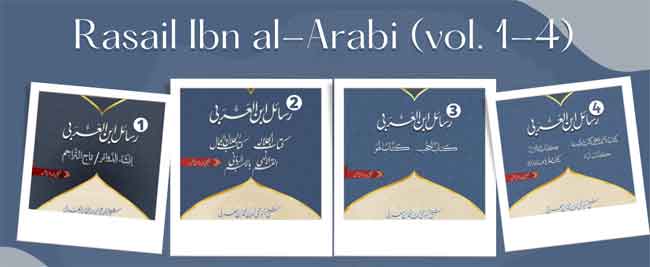The MIAS Blog: News and Views about Ibn Arabi
More Recent Posts

One of the most neglected issues

Reading Circles in MIAS Latina

French translation of Fusûs al-Hikam

Keith Critchlow, 1933–2020

Online Introductory Course

Michel Chodkiewicz 1929–2020

Young Writer Award 2019
New editions of Rasail Ibn al Arabi

Rasail Ibn al-Arabi, Critical editions of texts and Urdu translation by Abrar Ahmed Shahi, published in four volumes by the Ibn al-Arabi Foundation, Rawalpindi, Pakistan, 2021.
In the last part of 2021 the Society in Oxford received as a gift Volumes Two, Three and Four of the Rasail Ibn al-Arabi, published by the Ibn al-Arabi Foundation of Rawalpindi, Pakistan. The books are a welcome addition to the Society Library.
The four volumes of the Rasail contain the Arabic text of eleven shorter works by Ibn ‘Arabi, each translated into Urdu. These are Inshāʾ al-dawāʾir and Tāj al-tarājim (Vol. 1); Kitab al-Jalāla, Kitab al-Jalāl and Kitab al-Qasam al-ilāhī (Vol. 2); Kitab al-Ḥujub, Kitab al Hu (Vol. 3); Kitab al-Alif, Kitab al-Azal, Kitab al-Ba, Risala Mim, waw, nun (Vol. 4).
Each Arabic text is a critical edition, that is to say, based on comparison of the best manuscripts available, with notes of the differences between them, generally with explanation of the choices made between alternatives by the editor, and so is a contribution to Ibn ‘Arabi scholarship. The translation into Urdu opens these works of the Shaykh to a huge number of readers.
The Foundation is dedicated to bringing out works of Ibn ‘Arabi in accurate Arabic editions, and publishing translations of these in contemporary Urdu. It was established in Rawalpindi, Pakistan, in 2007 as a collaboration between Abrar Ahmed Shahi and Hamesh Malik.
The Foundations’s first publishing effort was in 2008, a translation into Urdu of 12 shorter works by Ibn ‘Arabi, selected from the book Rasâ’il Ibn al-‘Arabî, published in Hyderabad Deccan in 1948.
Over the years Abrar Ahmed Shahi has edited and translated more than 30 works by Ibn ‘Arabi, and the Ibn al-Arabi Foundation has published more than 20 books.
Since November 2015 the founders say they have worked under the spiritual guidance of Shaykh Ahmad Muhammad Ali from Egypt, who helps them to establish correct readings of Ibn al-Arabi’s words, with reference to the available manuscripts. The volumes received by the Society acknowledge his contribution on the title page.
Longer books produced by the Foundation include:
Anqāʾ mughrib (2020)
Mawāqiʿ al-nujūm (2019)
Fuṣūṣ al-ḥikam (2015, Funded by TIMA – The Islamic Manuscript Association – 2014)
Kashf al-maʿnā (2014)
Kitab al-Tadbīrāt al-ilāhiyya (2013)
Rūḥ al-quds fī munāṣaḥat al-nafs (2012)
Kitāb al-Isfar ‘an Natā’ij al-Asfār (2012)
Kitab Mukhtaṣar al-durrat al-fākhira (2012)
This list includes very well known works by Ibn ‘Arabi.
Along with the 11 shorter works, the critical editions of the longer works are sometimes the first published for each of these. It should be said that is also possible for two competent people to produce differing “critical editions” of the same work. Differences may arise from the use of different manuscripts, and from different editorial choices when there are ambiguities.
It is clear that the work on the Arabic texts has benefitted from the greater availability of digital copies of manuscripts from Turkish collections in recent years, and from the reasearch that has gone into the Ibn ‘Arabi Society’s Catalogue of Ibn ‘Arabi’s works, which has facilitated the selection of the best manuscripts.
All of the books listed above have been translated into Urdu. Only three of the eight longer books listed have been translated into English or French in full as yet, while two have been partially translated, and three have not been translated into English or French at all. Few of the 11 shorter works have been translated into any European language. This underlines the scale of the Foundation’s translation effort.
In addition, the Foundation has recently published Marifat e Qayamat, an Urdu translation of five chapters about the Hereafter from the Futūḥāt al-Makkiyya. This was done using the text provided by the critical edition of Abd al-Aziz Sultan al-Mansub.
Mor information about the Ibn Arabi Foundation and its publications can be found on its website http://ibnularabifoundation.org/index.php/en/ [/]. Abrar Ahmed Shahi also has Facebook and LinkedIn accounts, and publishes on Academia.edu.
